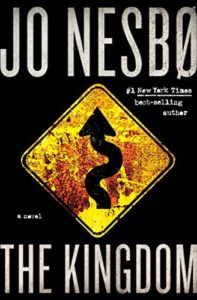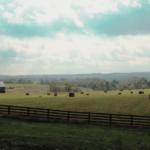Norwegian crime writer Jo Nesbø has been my favorite author since I was a college student browsing the shelves of the Half Price Books down the road from my university. I picked up a copy of his first Harry Hole novel, The Bat, on the recommendation of another crime fiction reader in my life, and I was instantly hooked. Nesbø’s gritty, character-driven writing transported me across the world, traveling in the footsteps of his troubled, brilliant series protagonist, Harry Hole. Nearly 10 years after I first read The Bat and fell in love with Nesbø’s writing, I have my dream job working for his US publisher, handling publicity for his books here in the States.
Any new book from Jo Nesbø is cause for celebration, but there’s something extra special about his 2020 publication, The Kingdom, which hits American bookstores this month. No two Nesbø novels are exactly alike, and in his standalone novel The Kingdom, Nesbø shows readers a softer—but no less sinister—side of his crime writing talent. In The Kingdom, Nesbø trades in serial killers and series protagonist Harry Hole for a standalone tale of two brothers and the deadly secrets they have been keeping since childhood. Roy and Carl Opgard grew up in the (fictional) Norwegian mountain town of Os, on a piece of land their father referred to as their “kingdom.” Roy was always content with small-town life; Carl couldn’t wait to get away at the first possible opportunity, packing his bags and heading to Ameri
ca in pursuit of bigger and better things. Roy assumed he would never see his little brother again… until one day, years later, Carl returns to Os, bringing with him a mysterious new wife and a shady plan to “revitalize” the town by developing a luxury hotel just down the road from the brothers’ farm. Carl’s reappearance shocks not just Roy but the town as a whole, stirring up long-forgotten rumors about the brothers, and about the accident that killed their parents years prior. Roy has always done whatever it takes to protect his little brother, but his loyalty is about to be tested in ways he never imagined. The Kingdom is a story of family, love, and greed—it’s a slow-burn crime novel that will captivate readers with its quiet intensity, depth of character development, and the genuinely shocking twists it has in store.
I caught up with Nesbø by phone this fall to talk all things The Kingdom, including its highly personal inspiration, the influences of classic crime fiction on Nesbø’s work, and lots more.
Abby Endler: For readers who might not be familiar with the region of Norway in which The Kingdom takes place, could you describe it for us?
Jo Nesbø: The town of Os isn’t an actual place in Norway, but the surroundings are real enough. This book takes place in the valleys and mountains to the west of Oslo, heading towards the West coast and the big fjords. It’s not that far from the cities, but it’s remote enough that it has its own culture. This part of the country is a lot like our version of Appalachia. Many people consider it the “hillbilly country” of Norway.
AE: This setting felt so significant to the story to me, particularly because it is this very small town where everyone knows everyone else, and everyone wants to know everyone else’s secrets. For you as the writer, what does that small-town setting bring to the story? Did you find that there were major differences between writing a book set in a small town and writing a book set in a city like Oslo?
JN: Definitely. Actually, my experience of a small town like the fictional town of Os is based on where my parents grew up. When I was growing up I would spend most summer holidays and Christmas holidays in their villages. When I first traveled there, I was living in Oslo, and the biggest difference in my experience in those towns versus in Oslo was that in a small town, everyone knows who you are, and you can’t meet anyone without them contextualizing you based on your family name. Even if you’ve never spoken to people you meet in those towns, they will know your family, they will know your background. And that brings two things. It brings the comfort of familiarity—you feel safe, you feel taken care of. On the other hand, it’s something you can’t escape—it’s a lack of freedom, and it can become claustrophobic. You can’t escape the kind of person people perceive you to be based on your family’s reputation. In the city, on the other hand, you can reinvent yourself, you can make yourself out to be something new—something that might be more to your own liking. There are pros and cons to both, and I think there may be a slight difference in personality between young people who choose to leave their little village to go to a bigger city, and those who choose to stay—and that is the case with Roy and Carl in The Kingdom. One chooses to go to the United States, and the other stays in the little village.
AE: Absolutely. And speaking of Roy and Carl, readers get to know these two characters so intimately in The Kingdom. I was thinking about it, and I don’t think I’ve read any recently-released crime novels that really focus on the relationship between brothers the way you do here. Could you share with us what inspired you to make this the focal point of your new novel?
JN: The reason for me is quite simple. I have two brothers, one who passed away a few years ago. He was my young brother, and he passed away from cancer. We were really close—we shared bunk beds just like Roy and Carl in this story, and we played for the same soccer team. Later on we moved to Oslo together, and then we started playing in the same band. We played together in that band until he passed away. We were always really close. Of course, the relationship between Roy and Carl is by no means a replica of my relationships with my two brothers, but I think what I took from my own relationships with my brothers is that sense of limitless loyalty that you have when you have a brother. This is the person who is closest to you. This is the person who knows you even more intimately than even your parents, because you share everything. You expose both your weak side and your strong side in this relationship with your brother. So as much as you are a strong team and a united force to the outside world, on the inside you are vulnerable with one another, because they know your weaknesses as much as your strengths. They know how to make you angry, how to make you laugh, all those things—they are the people that you fight with and the people that you love. And I wanted to write about that. In previous novels I have written about father-son relationships, and I think in many ways it was just a matter of time before I would write about brothers.
AE: I was really interested in the connection between Norway and America in this story, particularly with Roy and Carl’s father, who seemed to be a bit obsessed with all things American! Where did that connection come from? Do you have your own family connection to the US?
 JN: Yes, I do. First of all, it’s by no means a far-fetched connection. In some places in Norway, there were villages where almost half the village population emigrated to the United States. In the 19th and 20th centuries, there was such a fluctuation of Norwegians going to the United States, that Amerikabrev (“letters from America”) was sort of a literary genre in Norway. Where you would read about the free world, and how much bigger and better everything was in the United States, and the people back home reading these letters wished to move to the US and emulate this success. In those years, most of the Norwegians traveling to the United States would settle in Minnesota and the Midwest. My grandmother went to the United States when she was 16 years old, and then she came back to Norway where she met my grandfather, and they went back to the United States together. My father grew up in Brooklyn, New York, in the Bay Ridge area. He didn’t return to Norway until he was 12 years old. So I do have a strong personal bond with the United States.
JN: Yes, I do. First of all, it’s by no means a far-fetched connection. In some places in Norway, there were villages where almost half the village population emigrated to the United States. In the 19th and 20th centuries, there was such a fluctuation of Norwegians going to the United States, that Amerikabrev (“letters from America”) was sort of a literary genre in Norway. Where you would read about the free world, and how much bigger and better everything was in the United States, and the people back home reading these letters wished to move to the US and emulate this success. In those years, most of the Norwegians traveling to the United States would settle in Minnesota and the Midwest. My grandmother went to the United States when she was 16 years old, and then she came back to Norway where she met my grandfather, and they went back to the United States together. My father grew up in Brooklyn, New York, in the Bay Ridge area. He didn’t return to Norway until he was 12 years old. So I do have a strong personal bond with the United States.
But what I say about the strong connection to the United States is quite typical in Norway, particularly for people in the Southwest coast of Norway. You can even see it in the language there, where they use lots of Americanized words. It’s very peculiar for the rest of Norway! In some places in Norway they even started to build their houses like they do in the Midwest, and American cars have also always been something that people love to have around. Certain parts of Norway are very strongly influenced by American culture, and sometimes Norway even calls itself the “51st state of the United States.”
AE: You mention American cars, and I couldn’t help but notice there are so many references to classic American muscle cars in your new book. I have to ask, are you a car guy?
JN: I’m really not, no! One of my friends helped me with research about American cars. But I did have a Chevy van for a while, when we started our band and we were driving around everywhere, we needed a car to transport the band. So we had this really posh… [laughs] okay, posh-slash-redneck Chevy van that we used.
AE: Whether you’re writing the Harry Hole books or your standalone novels, something I love so much about your books is the way you explore the inner lives of your characters. The Kingdom felt to me like one of the most emotional stories you’ve written yet—particularly given the love story at its core. Was this an emotional story for you to write?
JN: Yes. The short answer is, yes, it was more emotional. In the Harry Hole series, there may be other themes that are the main themes, but here love really is the main thing. Love and murder, as always, but I think that love is more of a driving force in this story than hate.
AE: Speaking of the Harry Hole series, I think fans of that series will recognize the darkness of your writing in this book, but they will also find that it’s quite a different style than what they’ve come to know in your Harry novels. I’m curious, why this shift away from writing a more traditional detective story?
JN: For me it’s never about setting out to write one type of story or another, or shifting from one style to the next. Although I’ve written many books in the Harry Hole series, I’ve never had the feeling that I’m going to write one particular kind of book. Even in the series, I always try to seek out new challenges or new themes that I’m curious about. For me, I simply come up with an idea for a story… or I actually don’t even have the feeling that I’m “coming up with” the idea, I have the feeling that the idea is sort of just there, almost that I discover an idea. I might even discover, like in this case, that I’m almost surprised that I’ve never written about this topic before. I have this feeling that, okay, I want to write about this. Is it a Harry Hole novel? No, it’s not, so it’s a standalone novel. And then I begin to build my characters, and the universe evolves from that. It’s not an idea in the sense of “now I’m going to do something different,” it’s just an idea and the story evolves into something that is quite different from what I’ve written before.
AE: Do you find that the actual process of writing the book is very different when you are writing a standalone story versus writing an installment in Harry’s series?
JN: I actually think that the biggest difference with this book is that I’m writing it from a first-person narrator. With that you get different prose, and you are telling the story in a very different way. With the first-person narrator, you can have the voice that is telling the story maybe second-guessing themselves, maybe doubting themselves, maybe being a bit unreliable… and you can do that, you can get away with that, with a first-person narrator. And that is sort of a very specific technical difference between this book and previous Harry books, but it’s a very big decision when you start writing a book. In a story like this you only have one point of view, so you restrict yourself in some ways with this decision, but you also give yourself the opportunity to penetrate some of the characters and their emotions more deeply this way as well.
AE: Many of the early US reviews of The Kingdom have drawn a parallel between this book and classic crime fiction from authors like Jim Thompson and Raymond Chandler. Were you consciously finding classic crime fiction influential while you were writing this book? Or was that something that just evolved?
JN: I think it’s hard for me to pinpoint the exact influences in a book like this. I was actually never a big Raymond Chandler reader, I did read some of his novels, but I was a little late because I read some of the novels that were influenced by Raymond Chandler first. But I am a big Jim Thompson fan, and I think there are similarities to Pop. 1280 and The Killer Inside Me in this book. I’m sure that I am influenced by Jim Thompson, but it’s hard for me to pinpoint the exact ways he has influenced me. Maybe the fact that I’ve chosen to set The Kingdom in a small place with, well, maybe the population is around 1280! [laughs] So it’s easy to see those parallels here. But I also think this is not the first novel I’ve written which is inspired by Jim Thompson.
AE: Definitely. Blood on Snow and Midnight Sun both spring to mind for me as books of yours that have a similarly classic crime-inspired feel to them.
JN: Yes, absolutely.
AE: For my last question here, I’d love to know if you can share anything with us about what you are working on next!
JN: Right now I’m working on two projects, one is about rock climbing, and one is a collection of short stories.
***


















